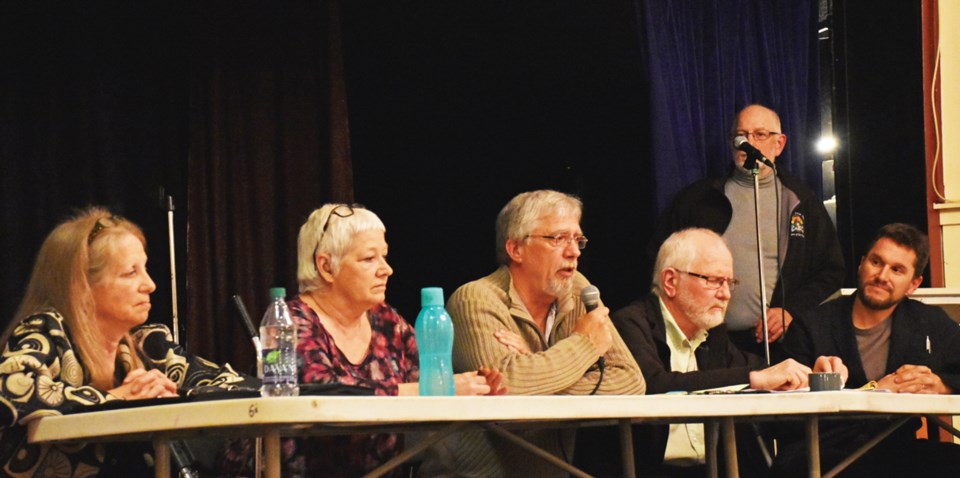Throngs of Creekers and a few outsiders attended a lively all-candidates forum at Roberts Creek Community Hall on Oct. 11 to hear the platforms of the five nominees for Area D Sunshine Coast Regional District (SCRD) director.
Candidates – none of whom have served on the SCRD board – were asked about their values and experience and faced an hour’s worth of questions from the approximately 200-person crowd. They also tackled affordable housing, taxation and funding for the arts, with one candidate responding in rhyme.
Water, however, emerged as the key issue and solving the shortage was the first question of the night.
Both Steve Baker and Hans Penner took conservationist approaches. Keeping logging out of Elphinstone and building a reservoir were Baker’s priorities while Penner said meters aren’t necessarily the solution and neither is the Chapman drawdown. Instead, he promoted watershed protection, fast tracking the reservoir, residential and farm rainwater storage and additional supply via Gray Creek.
Later in the evening, Penner also recalled a legal battle between the SCRD and the province over the watershed and said that if elected he would refresh the court case and “maybe pursue a judicial review.”
Andreas Tize and Cathrine Fuller were more conservative, both stating they would prefer to see results from the reservoir feasibility study before drawing any conclusions about water priorities. Neither support the Chapman drawdown since it could mean declassifying Tetrahedron as a Class A provincial park, though Tize conceded “it might just have to happen depending on how the other options go.” He also said diversifying water sources is key. Fuller said she was willing to hear any suggested solution, “including Clowhom Lake, which could get me shot.”
Barbara Hague, meanwhile, drew from her more than 40 years in the fishing industry to emphasize the need to manage water. “No management, no fish,” she said before adding, “Water is sacred. Global warming is not waiting for us.”
Of the five candidates in Area D, which has the most nominees running in the SCRD, Penner and Hague ran in 2011 and 2014. The rest are new to campaigning for local government.
Baker emphasized his union work when asked about his experience and ability to work with others. “I represented over 5,000 employees in about 18 different contract groups throughout the City of Vancouver, Vancouver School Board, Langara College,” among other organizations, said Baker. He said he had been to one SCRD board meeting, but that it was the same structure that he’s attended elsewhere.
Fuller drew from her local reporting experience. “Long ago and far away when I was the editor and reporter for the Coast News here, the SCRD was my beat, so I can’t even count the number of meetings and committee meetings that I’ve been to,” she said. “I have a really good understanding of the structure of the SCRD, how it relates to provincial and federal jurisdictions and what we can and can’t do.”
Tize acknowledged he had only been to one meeting since deciding to run a month ago. “I don’t think the number of attended board meetings gives a huge indication as to the competence the candidate would have in representing the community,” he said. When asked who he would consult with when making decisions, Tize said he would “definitely be leaning heavily on Mark [Lebbell], the APC and OCP committees as well as current candidates” and other people of influence.
Hague, meanwhile, cited her accounting skills and commitment to projects as key assets. “I walk my talk, I’ve always completed what I set out to do,” she said.
Penner highlighted his experience as a project manager for the Ministry of Transportation and his time spent on a conflict resolution committee in the Caribou region. “We all should keep in mind the bigger picture when making decisions, from the local level to the higher level,” he said in response to a question about environmental sustainability.
When asked about funding for cultural events like Creek Days and the painting of the community mandala, all voiced their support for local initiatives. Fuller said while “creativity is the soul of the community,” she couldn’t promise to increase anything until she sees what there is to work with. “The water is really, really important right now,” she said.
Baker said arts funding is often grant-based and less predictable. “Let’s look at something like giving these groups some sustainability,” he said to applause.
More applause was then handed to Hague, who responded that she is a closet artist before breaking into verse. “Oh, to be a fisherman, to ride the golden wave, to fish the silver salmon in all its glory days, lost to industrial pollution an excuse for modern ways, oh to be a salmon, to fight for a place to stay.”



